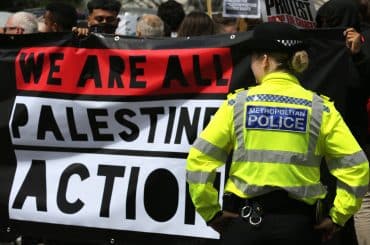One might think that the so-called paper of record, The New York Times, would find the landmark UC Berkeley student campaign to divest from weapons manufacturers that profit from Israel’s occupation and war crimes worthy of coverage. However, the Times has yet to print one word on the topic.
In contrast, the Times ran stories about UC Berkeley and other campus anti-South African Apartheid campaigns as far back as 1978, at a time when they were at an arguably less-evolved stage of development than today’s campaigns. See for example this 1978 article (full text behind paid firewall), which showed up in a search for the words Berkeley, divestment, and South Africa.
Of course, the Times’ blackout of Israel-related divestment is consistent with their long-standing pro-Israel bias, as documented here: I submitted to the Times an oped fairly similar to one I wrote that Haaretz printed. Haaretz said yes, and after three inquiries, the Times said no, once again demonstrating that criticism of Israel is more acceptable in the Israeli press than the U.S. press. Here’s what the Times wouldn’t print:
Students Spark Momentum to End Israel’s Oppression of the Palestinians
By Matthew A. Taylor
At one time South Africa’s apartheid regime seemed immovable. This is the case again today with Israel’s rule over the Palestinians — described accurately, in my view, as apartheid-like by former President Jimmy Carter. But on March 18th of this year, University of California, Berkeley student senators voted to recommend that the UC Board of Regents divest from General Electric and United Technologies, two companies that have profited from Israel’s occupation of Palestinian land. The student president subsequently vetoed the bill, and student senators fell one vote short of the necessary two-thirds needed to overturn the veto. However, the bill’s eventual passage seems inevitable, given Israel’s ever-tightening grip on the Palestinian territories and increasing student outrage.
A majority student vote in favor of a divestment recommendation would have been unimaginable on the Berkeley campus just five years ago. But the evidence of Israel’s war crimes in Gaza as documented by the United Nations, Human Rights Watch, and Amnesty International changed many minds.
Even high-ranking Israeli government officials are acknowledging the country’s descent into an apartheid-like state of affairs. In a speech at a national security conference this past winter, Israeli Defense Minister Ehud Barak stated that if Israel does not end the occupation, and millions of Palestinians living under occupation continue to be barred from voting in Israeli elections, “That will be an apartheid state.” In such a scenario, former Prime Minister Ehud Olmert told Israeli newspaper Ha’aretz that Israel’s American Jewish organizational supporters, “which were our power base in America, will be the first to come out against us because they will say they cannot support a state that does not support democracy and equal voting rights for all its residents.”
At Berkeley’s three senate hearings on the divestment recommendation, Olmert’s prediction came to life before my very eyes. Proponents of the bill represented a diverse multitude of Jewish, Christian, Muslim, and secular speakers; Israelis and Palestinians; white Americans, African-Americans, and Americans from all races and backgrounds. Five Nobel Peace laureates endorsed the bill, and hundreds of prominent Israeli and American Jews signed petitions and letters of support, including Israeli Prime Minister Netanyahu’s sister-in-law Ofra Ben-Artzi.
Many American Jews are becoming increasingly disenchanted with an Israeli state that does not reflect Jewish values of justice and fairness in its conduct toward the Palestinian people. This is especially true of young Jews. We who voted for and advocated for this divestment bill are the same young college students who elected Barack Obama on a platform of hope and change.
AIPAC, the campus Hillels, and the ADL peddle propaganda that those of us in the younger generation no longer accept. Many of us have traveled to the occupied territories and witnessed the oppression of Palestinians. We find it intolerable.
Time is rapidly running out on the two-state solution — if it hasn’t already. With every settlement expanded by Prime Minister Netanyahu, the end of the militarily enforced Jewish-majority state is hastened. University of Chicago political scientist John Mearsheimer recently predicted that Israel’s intransigent attachment to settlements and lack of political motivation to end the occupation of the West Bank will doom the two-state solution, and a binational state with equal rights is the only realistic outcome.
Three decades ago, students led the charge to divest from South Africa’s apartheid. “We could not have achieved our freedom and just peace without the help of people around the world, who through the use of non-violent means, such as boycotts and divestment, encouraged their governments and other corporate actors to reverse decades-long support for the Apartheid regime,” Archbishop Demond Tutu wrote in a letter to Berkeley’s student senate endorsing the current divestment bill.
Influenced by student-led divestment campaigns, in 1986 the U.S. Congress passed the Comprehensive Anti-Apartheid Act. Just as with South Africa, U.S. government officials must eventually follow the students’ lead and take action to secure Palestinian human rights. The Obama administration and Congress should cut off $3 billion in annual military aid to Israel, or at least condition it on Israel ending its occupation of Palestinian land.
Matthew A. Taylor is a UC Berkeley Peace and Conflict Studies student on leave, and co-author of “The Road to Nonviolent Coexistence in Palestine/Israel,” a chapter in the book “Nonviolent Coexistence.”

